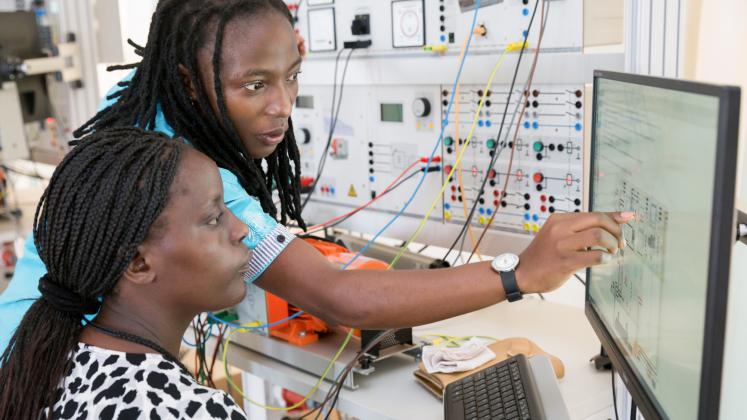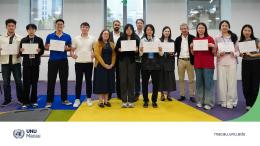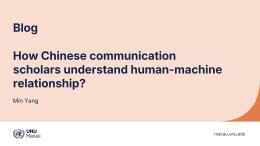As Africa gears up for a digital revolution, at the Tokyo International Conference on African Development (TICAD) Ministerial Meeting, to be held on 23 August 2024, the United Nations University, the African Union, and Pan-African University will co-host the Innovation in Africa event.
This is a unique opportunity to showcase the transformative potential of the African Digital Compact (ADC) and the Continental Artificial Intelligence Strategy (CAIS). This thematic discussion is not just about ideas; it’s about shaping Africa’s digital future. It’s about how innovation can drive sustainable development and position the continent as a global player in the digital age.
In a significant move, the African Union demonstrated its leadership and commitment to Africa’s digital future by adopting the ADC and the CAIS in July 2024. These are not just policy documents; they represent a unified vision. The ADC aims to harness the power of digital technologies for economic growth, societal well-being, and long-term development across the continent.
The CAIS aims to leverage artificial intelligence (AI) for sustainable development in Africa, aligning with Agenda 2063 and the Sustainable Development Goals (SDGs). Agenda 2063 is Africa’s 50-year socioeconomic transformation framework, adopted by the African Union in 2013.
It focuses on inclusive growth, sustainable development and a united political and economic landscape. It addresses challenges like poverty, inequality and climate change and promotes good governance and peace. The CAIS advocates ethical AI practices, calls for harmonized national strategies, and encourages regional and global collaboration to achieve Agenda 2063.
The Innovation in Africa event is a perfect opportunity to unite the vision for Africa’s digital future. It will explore how digital transformation can address Africa’s unique challenges and pave the way for progress towards Agenda 2063. This unity of vision, which the event aims to foster, is what will drive Africa’s digital future.
Africa is already home to several ground-breaking initiatives that align with the ADC’s and the CAIS’s objectives. The Deep Learning Indaba, for example, is an annual gathering of African researchers and practitioners in machine learning and AI. It seeks to strengthen African machine learning by fostering communities, developing talent and encouraging excellence.
This initiative exemplifies how Africa prepares the next generation of innovators to lead the continent’s digital transformation.
Thriving start-up ecosystem
Similarly, Africa’s thriving start-up ecosystems are rapidly expanding, with companies such as Lelapa emerging as critical players in the tech sector. Lelapa, a South African AI company focused on solving African challenges with local solutions, exemplifies how African start-ups drive innovation from within the continent.
Companies such as these depend on extensive databases like the one initiated by Masakhane Natural Language Processing (NLP), a grassroots organization that promotes NLP research in African languages. The Masakhane initiative is a foundation for developing the African Large Language Models.
Zipline’s drone delivery network in Rwanda has revolutionized health care by delivering essential items like blood and vaccines in remote areas. This innovative system overcomes geographical barriers, improving health-care outcomes and showcasing drone technology’s potential.
These African ecosystems encourage entrepreneurship, create jobs, and contribute to economic growth, which is critical to the ADC’s and the CAIS’s mission.
Innovation in Africa will bring together experts from academia, the private sector and recent university graduates to discuss how the ADC and the CAIS can help Africa achieve Agenda 2063.
The discussions will focus on bridging the digital divide and empowering communities through digital skills training — critical steps towards ensuring that all Africans, regardless of location or socioeconomic status, can take advantage of the digital economy’s opportunities.
The event will also address critical issues such as decent work and inclusive economic growth in the context of AI and technological advancements, entrepreneurship in the face of climate change and digital transformation, and the importance of leveraging innovation and training to support youth career opportunities.
These discussions will focus on how the ADC’s and the CAIS’s strategic frameworks can be used to foster a culture of innovation and entrepreneurship, which is critical for creating jobs and building a resilient, self-sufficient Africa.
The ADC and CAIS should be viewed within the context that digital transformation is about more than technological advancement; it is also about improving human well-being, protecting digital rights and fostering social cohesion. By putting people at the centre of their vision, the ADC and CAIS intend to create a more inclusive and equitable digital landscape across Africa.
However, these initiatives are happening while the United Nations has similar frameworks: the Global Digital Compact (GDC), which can be viewed as the global version of the ADC, and the High-Level Advisory Body (HLAB) on AI, which deals with AI at a global level as opposed to the CAIS, which focuses on the African continent.
The GDC and HLAB on AI must be aligned with the ADC and the CAIS to ensure that the African continent reaps the benefits of digital and AI advancements. The GDC and the recommendations of HLAB on AI will feed into the Summit of the Future in September 2024. The Summit of the Future is an international conference to address global challenges, promote global governance, and advance sustainable development.
The ADC, GDC (which is still to be finalized), the CAIS, and the HLAB on AI (which is also to be finalized) should be inextricably linked, forming a symbiotic relationship that advances a digital and AI-empowered future at regional and global levels.
Both compacts are expected to share a common vision: a world in which digital technologies promote inclusive development, boost economic growth and improve societal well-being. This will help to bridge digital divides, protect digital rights and create a secure and equitable digital environment for all.
The discussions at the TICAD Ministerial Meeting’s side event on innovation in Africa will highlight Africa’s determination to partner with countries worldwide, including Japan; and to seize the opportunities presented by digital technologies. The ADC is a guiding framework for this journey, ensuring that digital transformation drives inclusive growth and shared prosperity across the continent.
As Africa addresses its unique challenges and seizes opportunities for innovation, aligning the ADC and the CAIS with global frameworks such as the GDC and the HLAB on AI is critical. This strategic alignment ensures that Africa’s vision for a digital and AI-enabled future is seamlessly integrated with global efforts, promoting inclusive growth and prosperity.
Africa’s commitment to driving progress through digital innovation and collaboration and establishing the continent as a critical player in the global digital economy is crucial for attaining Agenda 2063.
This article was first published by Daily Maverick. Read the original article on the Daily Maverick website.
Suggested citation: Tshilidzi Marwala. "Shaping Africa’s Digital Future and Positioning the Continent as a Global Player," United Nations University, UNU Centre, 2024-08-13, https://unu.edu/article/shaping-africas-digital-future-and-positioning-continent-global-player.






